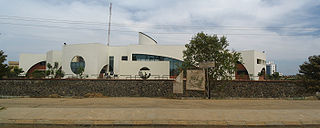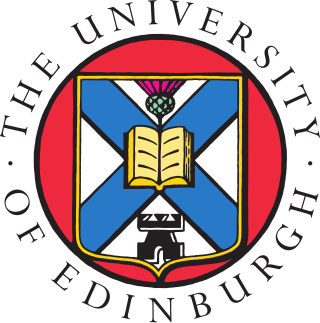
Dundee is the fourth-largest city in Scotland. The mid-year population estimate for 2016 was 148,210, giving Dundee a population density of 2,478/km2 (6,420/mi2), the second-highest in Scotland. It lies within the eastern central Lowlands on the north bank of the Firth of Tay, which feeds into the North Sea.

The British Computer Society (BCS), branded BCS, The Chartered Institute for IT, since 2009, is a professional body and a learned society that represents those working in information technology (IT), computing, software engineering, computer engineering and computer science, both in the United Kingdom and internationally. Founded in 1957, BCS has played an important role in educating and nurturing IT professionals, computer scientists, software engineers, computer engineers, upholding the profession, accrediting Chartered IT Professional (CITP) and Chartered Engineer (CEng) status, and creating a global community active in promoting and furthering the field and practice of computing.

Edinburgh Napier University is a public university in Edinburgh, Scotland. Napier Technical College, the predecessor of the university, was founded in 1964, taking its name from 16th-century Scottish mathematician and philosopher John Napier. The technical college was inaugurated as a university in 1992 by Lord Douglas-Hamilton, becoming Napier University. In 2009, the university was renamed Edinburgh Napier University.

Abertay University is a public university in the city of Dundee, Scotland. In 1872, Sir David Baxter, 1st Baronet of Kilmaron, left a bequest for the establishment of a mechanics' institute in Dundee and the Dundee Institute of Technology was formed in 1888. As early as 1902 it was recognised by the Scottish Education Department as an educational hub, and was one of the first to be designated a central institution, akin to an "industrial university". Abertay gained university status in 1994.

Chennai Mathematical Institute (CMI) is a higher education and research institute in Chennai, India. It was founded in 1989 by the SPIC Science Foundation, and offers undergraduate and postgraduate programmes in physics, mathematics and computer science. CMI is noted for its research in algebraic geometry, in particular in the area of moduli of bundles.
Globaloria is an online learning platform oriented to K-12 curricula to teach students to design, prototype, and code educational web/mobile games and simulations with industry-standard technology as a means of learning content and creative innovation skills. Globaloria was developed in 2006 by Idit Harel as a project of the World Wide Workshop Foundation with the stated mission of providing all primary and secondary school students in the U.S. with STEM and computing education opportunities. Globaloria is noteworthy among MOOCs as it is based in constructionist learning theory and Harel's research in the MIT Media Lab.

The University of Edinburgh is a public research university based in Edinburgh, Scotland. Founded by the town council under the authority of a royal charter from King James VI in 1582 and officially opened in 1583, it is one of Scotland's four ancient universities and the sixth-oldest university in continuous operation in the English-speaking world. The university played a crucial role in Edinburgh becoming a leading intellectual centre during the Scottish Enlightenment and contributed to the city being nicknamed the "Athens of the North".
Informatics is the study of computational systems. According to the ACM Europe Council and Informatics Europe, informatics is synonymous with computer science and computing as a profession, in which the central notion is transformation of information. In some cases, the term "informatics" may also be used with different meanings, e.g. in the context of social computing, or in context of library science.

Informatics Europe is the European association uniting university departments, research labs and companies in the field of informatics.
Girl Geek Dinners is an informal organisation that promotes women in the information technology industry, with 64 established chapters in 23 countries. The organisation was founded in London, United Kingdom, by software engineer Sarah Lamb, who felt women were under-represented at information technology events after attending a geek dinner in 2005.

Moray College is a further education college based in Elgin, in Moray, northeastern Scotland. It has 1,500 full-time students and 8,100 part-time students. It employs approximately 370 staff and is a college of the University of the Highlands and Islands.
"Geek girl" is a 20th-century term, signifying a gendered subgenre within the modern geek subculture.
The Scottish Informatics and Computer Science Alliance (SICSA) is a "research pool" funded by the Scottish Funding Council. A research pool is a collaboration of Scottish university departments whose broad objective is to create a coherent research community that will improve the quality of research carried out in Scotland in the pool-related discipline.

McGill's Bus Services is a bus operator based in Greenock, Scotland. The company has grown to operate a network of routes covering much of the council areas of Inverclyde, East Renfrewshire, Renfrewshire, North Lanarkshire, Glasgow City, North Ayrshire, West Lothian, Falkirk and Dundee City. McGill's have several depots based in Greenock, Inchinnan, Johnstone, Edinburgh, Bannockburn, Balfron, Larbert, Livingston and Dundee. McGill's also formerly had depots in Dumbarton, Barrhead and Coatbridge.
Many in Canada share concerns about the current and future roles of women in computing, especially as these occupations increase in importance. As in many nations where computing and information technology are large industries, women in Canada have historically faced underrepresentation in education and industry. As a result, some Canadian women pursuing careers in these fields have had a lack of role models and faced sexism. There are many institutions and initiatives in Canada, however, which seek to increase representation for women in computing fields, as well as the fields of natural science and engineering in general.

Gender disparity in computing concerns the disparity between the number of men in the field of computing in relation to the lack of women in the field. Originally, computing was seen as a female occupation. As the field evolved, so too did the demographics, and the gender gap shifted from female dominated to male dominated. The believed need for more diversity and an equal gender gap has led to public policy debates regarding gender equality. Many organizations have sought to create initiatives to bring more women into the field of computing.

Talat Yaqoob is a Scottish campaigner, researcher, writer and commentator focused on women's equality, anti-racism and intersectional analysis of policy.
The 2021–22 Scottish Women's Premier League was the 21st season of the SWPL, the highest division of women's football in Scotland since 2002. The league is split into two divisions – SWPL 1 with 10 teams and SWPL 2 with seven teams, following the sudden resignation of Forfar Farmington in August 2021 – Partick Thistle were elevated to SWPL 1 to maintain an even number of teams, leaving SWPL 2 one short.

Ember is a coach operator based in Edinburgh, Scotland. It operates the first electric intercity coach services in Scotland.











